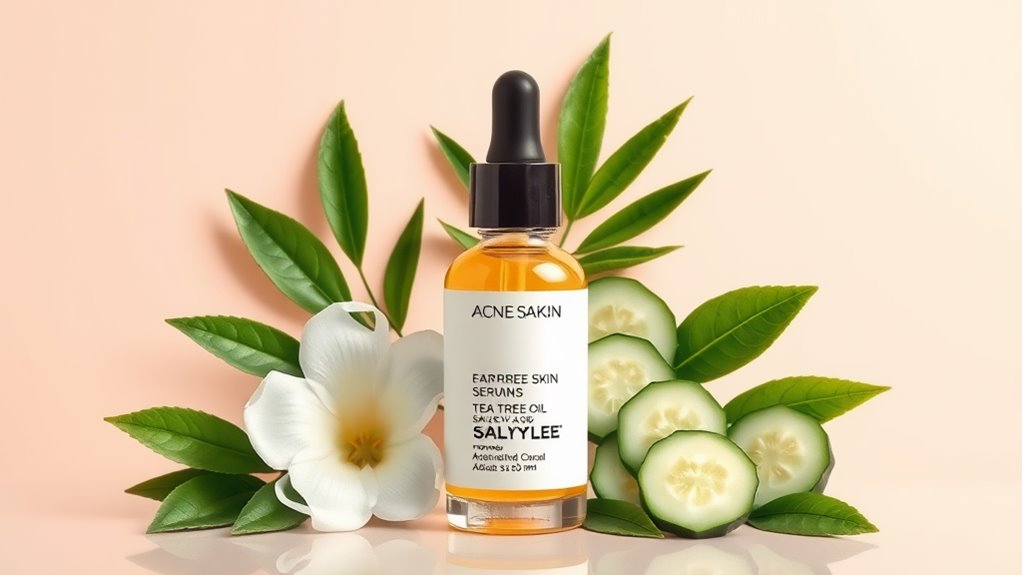Sensitive Skin- Avoid These Common Triggers
If you have sensitive skin, you know how easily it can react to different triggers. Harsh ingredients in products, environmental stressors, and even your lifestyle choices can lead to irritation and discomfort. It’s essential to identify these common culprits to maintain your skin’s health. But what specific factors should you be aware of? Let’s explore the most significant triggers and how you can effectively protect your skin.
Key Takeaways
- Avoid products with alcohol, fragrance, and sulfates to prevent excessive dryness and irritation on sensitive skin.
- Protect skin from environmental pollutants by using air purifiers and wearing protective clothing outdoors.
- Stay hydrated and limit processed foods and sugar to help manage skin sensitivity and prevent breakouts.
- Be mindful of seasonal changes; use protective barrier creams in winter and lightweight moisturizers in summer.
- Practice stress management techniques, such as yoga or meditation, to reduce inflammation and improve skin health.
Environmental Factors That Irritate Sensitive Skin
When you step outside, you mightn’t realize how much environmental factors can irritate your sensitive skin. Elements like pollution, sun exposure, and extreme weather can wreak havoc on your complexion.
Fine particulate matter from urban environments can penetrate your skin, leading to inflammation and irritation. Likewise, UV rays can compromise your skin’s barrier, causing redness and dryness.
Cold winds or excessive heat can exacerbate sensitivity, making proper sensitive skin care essential. To combat these issues, consider using a protective barrier cream or mineral sunscreen.
Staying hydrated and wearing appropriate clothing can also help shield your skin from harsh elements. By understanding these environmental triggers, you can tailor your sensitive skin care routine to minimize irritation and maintain a healthy complexion.
Harsh Ingredients to Avoid in Skincare Products
Although it might seem tempting to try the latest skincare trends, you should be cautious about the ingredients in the products you choose. Many ingredients can irritate sensitive skin, leading to discomfort or reactions. Always check labels and avoid the following harsh components:
| Ingredient | Common Products | Why Avoid |
|---|---|---|
| Alcohol | Toners, Gels | Dries and irritates |
| Fragrance | Moisturizers | Can cause allergic reactions |
| Sulfates | Cleansers | Strips natural oils |
Common Lifestyle Habits That Can Trigger Reactions
Even with the best skincare products, certain lifestyle habits can still trigger reactions in sensitive skin. One key factor is stress; it can lead to inflammation and exacerbate skin issues. Make sure to prioritize relaxation techniques like meditation or yoga.
Additionally, be mindful of your diet; processed foods and excessive sugar can ignite breakouts. Staying hydrated is essential, as dehydration can worsen sensitivity.
Avoiding tight clothing and harsh fabrics is also important, as they can irritate your skin. Finally, limit your exposure to environmental pollutants by using air purifiers indoors and wearing protective clothing outside.
Seasonal Changes and Their Impact on Sensitive Skin
As temperatures shift with the changing seasons, your sensitive skin can react in unexpected ways. You might find your skin becoming dry and irritated in winter or breaking out in the heat of summer. Each season brings unique challenges that can leave you feeling frustrated and vulnerable.
- Chilly winds that strip moisture from your skin
- Sweltering heat causing excessive oil production
- Allergens in the air during spring bloom
- Dry indoor heating that exacerbates sensitivity
- Humidity that can lead to unexpected breakouts
Understanding these triggers is essential for mastering your skincare routine. By recognizing how seasonal changes impact your skin, you can better prepare and respond, ensuring you maintain that healthy glow year-round.
Practical Solutions for Protecting Sensitive Skin
When it comes to protecting your sensitive skin, implementing practical solutions can make all the difference in maintaining its health and comfort.
Start by choosing gentle, fragrance-free cleansers and moisturizers designed specifically for sensitive skin. Always patch-test new products to catch any adverse reactions early. Keep your skincare routine simple—less is often more.
When outdoors, wear protective clothing and apply broad-spectrum sunscreen to shield against UV damage. Hydration is key, so drink plenty of water and consider a humidifier during dry seasons.
Finally, manage stress through practices like yoga or meditation, as stress can exacerbate skin sensitivity. By adopting these strategies, you’ll effectively safeguard your skin and enhance its resilience against irritants.
Frequently Asked Questions
Can Diet Affect the Sensitivity of My Skin?
Yes, your diet can greatly affect your skin’s sensitivity. Consuming anti-inflammatory foods rich in antioxidants can help soothe irritation, while processed sugars and unhealthy fats may trigger reactions. Pay attention to what you eat for healthier skin.
How Do I Know if I Have Sensitive Skin?
To determine if you have sensitive skin, pay attention to reactions like redness, itching, or burning after using products. If you notice these symptoms frequently, it’s likely your skin’s sensitivity is heightened.
Are There Any Age-Related Changes Affecting Sensitive Skin?
As you age, skin loses elasticity and moisture, making it more prone to sensitivity. Hormonal changes can also affect skin’s resilience, so adapting your skincare routine is essential for maintaining comfort and health as you get older.
Is Sensitive Skin Hereditary or Genetic?
Sensitive skin can indeed be hereditary. If your parents or siblings have it, you’re more likely to experience it too. Genetics play a significant role in your skin’s reactivity and overall sensitivity.
Can Stress Worsen My Sensitive Skin Condition?
Yes, stress can worsen your sensitive skin condition. When you’re stressed, your body releases hormones that can trigger inflammation and irritation, making your skin react more intensely to environmental factors. Managing stress is essential for skin health.
Conclusion
To keep your sensitive skin happy and healthy, stay aware of potential triggers in your environment and skincare products. Avoid harsh ingredients, and be mindful of lifestyle habits that could lead to irritation. Remember, seasonal changes can also impact your skin’s reaction, so adapt your routine accordingly. By choosing gentle, fragrance-free products and making simple lifestyle adjustments, you can effectively protect your skin and minimize discomfort. Prioritize your skin’s needs, and you’ll see the difference!





